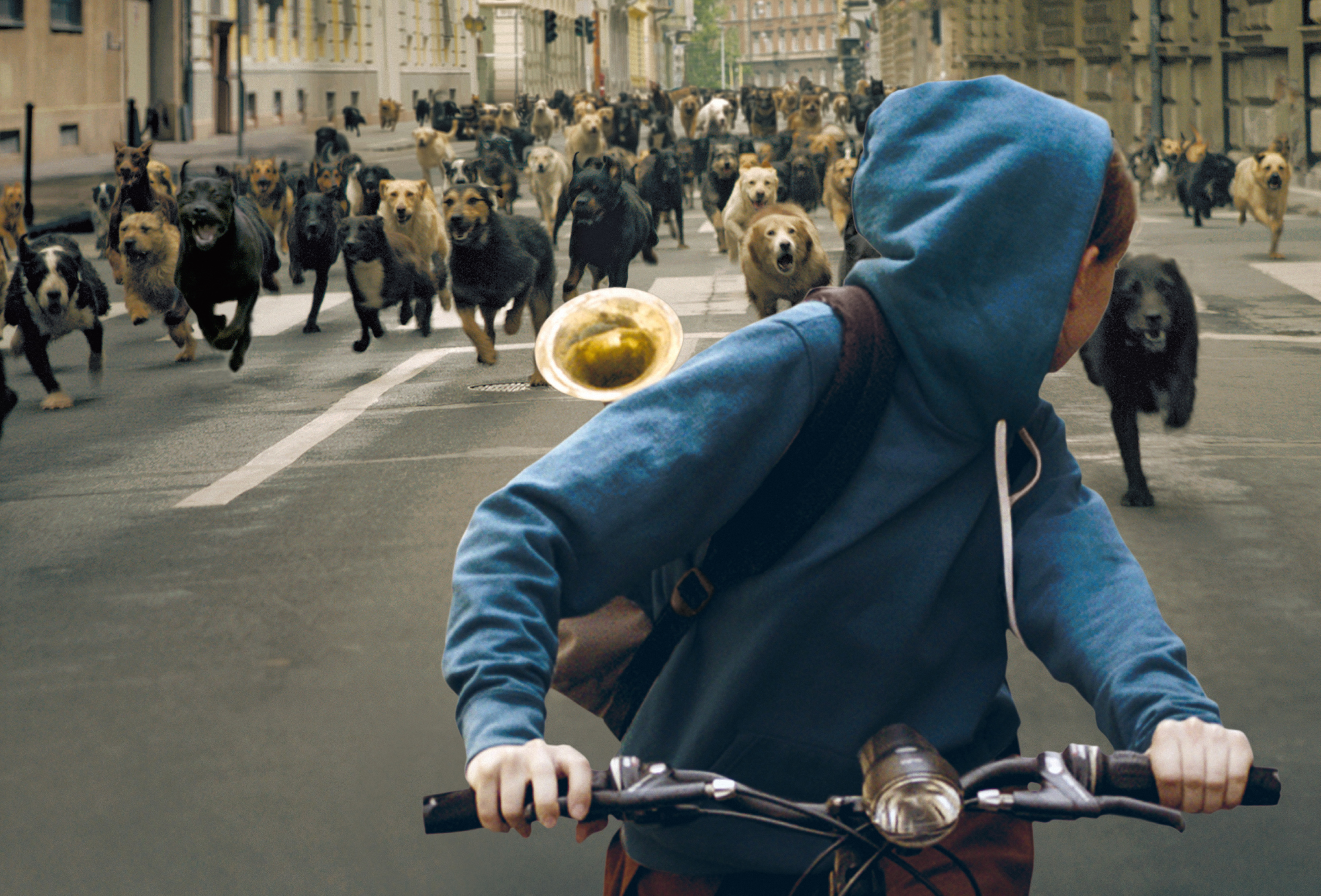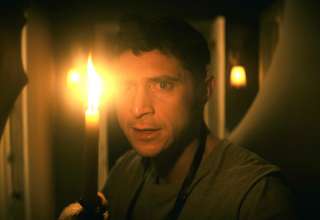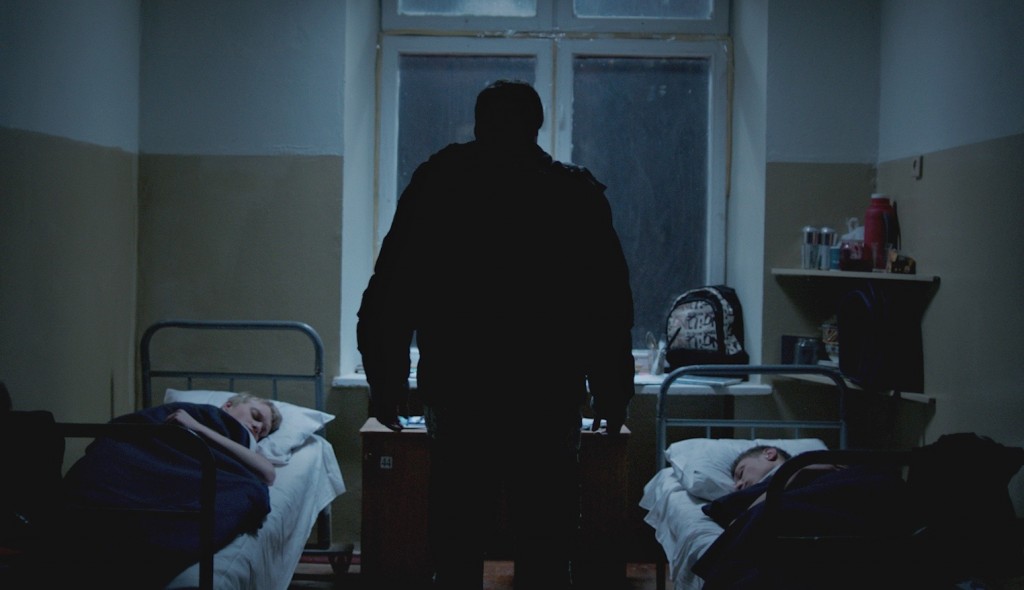Kornél Mundruczó’s White God begins with a surrealist canine nightmare that unfolds against the backdrop of abandoned urbanity: a young girl pedals through empty streets of Budapest on her bike, her trumpet poking out of the backpack slung over her shoulder. Suddenly, a horde of dogs, led by one especially determined mutt, comes barreling around a corner, intent on running her down. As any person who values their life might do, the girl pedals faster.
Her name is Lili (Zsófia Psotta). The dog at the head of the pack is named Hagen (played by twin brothers Brodie and Luke, a blend of Shar-Pei and Labrador), and to qualify him as Lili’s pet is to miss the point of the film. No sooner does this image sear itself into our minds than White God pulls a Sunset Blvd. and steals us back to the beginning, before fate led Lili and her faithful hound in the primal chase between predator and prey. Like so many aspects of Mundruczó’s movie, the opening retcon is a nod to convention, but White God is anything but conventional. Mundruczó draws bits and pieces of narrative across several mediums to sum to his story’s whole; this is a yarn about a kid and her dog that recalls Jack London, Eric Knight, Franklin J. Schaffner, Phillip Borsos, and even Danny Boyle in equal measure, but these influences are synthesized so cleanly that the results are purely original.
It might not even be a stretch to say that you’ve never seen anything like White God before. When we’re first acquainted with Lili and Hagen, they’re moving in with her dad, Dániel (Sándor Zsótér) for three months. It’s clear from the outset that Dániel isn’t particularly thrilled at sharing space with a dog, and following meddling from a nosey neighbor and a housecall from a municipal dog-catcher, Dániel is faced with a choice: pay a dog tax, imposed by the Hungarian government ostensibly to control their population of strays, or quite literally kick Hagen to the curb amidst Lili’s vehement protestations.
Exit Hagen, stage left.
Here, White God divides itself between the tale of Lili, a rambunctious, rebellious, lonely teen separated from her best friend, and the tale of Hagen, a loving, lovable, frightened pooch separated from his best friend. At home, Lili bristles against Dániel’s iron rule over her daily routine, rails against her band teacher, and rejects human contact outside of a crush she has on an older boy; in the sandbox of Budapest, Hagen seeks shelter and companionship but is either treated like a criminal or subject to appalling abuse. White God is at times difficult to engage with by virtue of content. Anyone with a serious weakness for cute doggies may watch the film through their fingers more often than not, particularly when Hagen crosses paths with a man who trains him for dogfighting. Mundruczó has made a shrewd choice in choosing Brodie and Luke to explore inner-city decay – Hagen goes everywhere and anywhere, snuffling through the cracks of metropolitan existence in pursuit of succor – but the movie isn’t a comment on Budapest’s neglected infrastructure. Rather, it’s an indictment of casual human amorality. Observing the cruelties inflicted on Hagen through White God’s running time, it’s no wonder Lili prefers the company of pooches to people.
Eventually, Hagen rallies the outcast dogs of Budapest and together they seek revenge against their oppressors, thus leading into Mundruczó’s opening image. It’s a fantastical sequence, but Mundruczó spends the bulk of White God laying that fantasy upon a decidedly authentic foundation. He earns his bloody climax through meticulous, practical filmmaking; his efforts produce a kind of hyper-reality where the defining details of Lili’s and Hagen’s stories derive from believable places and the picture’s bizarre overarching qualities feel like a product of aesthetic. The combined effect shrugs off categorization – is White God an intimate coming of age drama or a horror flick? – but it works when in all likelihood it might not have coming from another source. Try to imagine this idea in the hands of a Hollywood studio, who would surely use CGI to bring the dog army to life (Mundruczó uses hundreds of flesh and blood dogs to create that illusion), thereby breaking from the necessary element of verisimilitude.
Or, then again, maybe don’t do that. Just watch White God instead; there isn’t a 2015 release that’s quite so viscerally mesmerizing and deeply, genuinely emotional. There’s no manipulation here, no chicanery, no falsehood, just a frank, stylized attempt at critiquing man’s dominion over every creeping thing that creeps on the earth. It’s a dog’s life.
Rating: R
Director: Kornél Mundruczó
Cast:
Zsófia Psotta
Sándor Zsótér
Lili Horváth
Szabolcs Thuróczy
Lili Monori
Gergely Bánki
Tamás Polgár
Film Length: 116 minutes
Release Dates:
March 27, 2015 (Limited)
April 10, 2015 (Wide)
Distributor: Magnolia Pictures
Country: Hungary



















